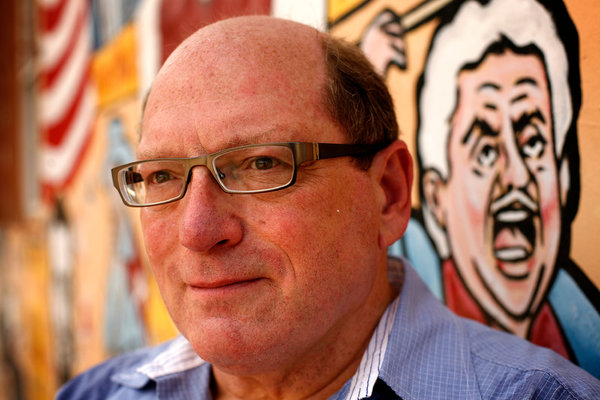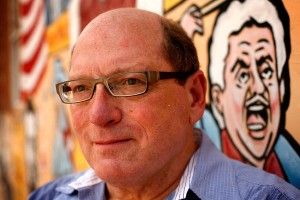
Oscar Hijuelos, Cuban-American writer who won Pulitzer, is dead at 62
By Bruce Weber
Oscar Hijuelos, a Cuban-American novelist who wrote about the lives of immigrants adapting to a new culture and became the first Latino to win the Pulitzer Prize for fiction for his 1989 book, “The Mambo Kings Play Songs of Love,” died on Saturday in Manhattan. He was 62.

Mr. Hijuelos collapsed on a tennis court and never regained consciousness, his wife, Lori Marie Carlson, said.
A New Yorker by birth, education and residence, Mr. Hijuelos was said to have been more American-Cuban than Cuban-American.
In novels like “Our House in the Last World” (1983), which traces a family’s travails from Havana in 1939 to Spanish Harlem; “Mambo Kings,” about the rise and fall of the Castillo brothers, Cesar, a flamboyant and profligate bandleader, and his ruminative trumpeter brother, Nestor; and “The Fourteen Sisters of Emilio Montez O’Brien” (1993), about several generations of a Cuban-Irish family in Pennsylvania, he wrote about the non-native experience in the United States from a sympathetic, occasionally amused perspective and with a keen eye for detail in his period settings.
Unlike that of many well-known Latin writers, his work was rarely outwardly political, focusing instead on the conundrums of assimilation. And rather than employing a syncopated musicality or fantastical flights of magic realism, Mr. Hijuelos wrote fluid prose, sonorous but more earthy than poetic, with a forthright American cadence.
“Everything was different back when; 125th Street was jumping with clubs, there was less violence, there were fewer beggars; more mutual respect between people,” he wrote, as Cesar Castillo reflected on his halcyon days.
“He could take a late-night stroll from the apartment on La Salle street, walk down Broadway, cut east on 110th Street to Central Park, and then walk along its twisting paths and across the little bridges over streams and rocks, enjoying the scent of the woods and nature’s beauty without a worry. He’d make his way to the Park Palace Ballroom at 3 Fifth Avenue, to hear Machito or Tito Puente, find musician friends at the bar, chase women, dance.
“You could walk through that park wearing your best clothes and a nice expensive watch without worrying about someone coming up behind you and pressing a knife against the back of your neck. Man, those days were gone forever.”
His characters were not necessarily new arrivals — in Mr. Hijuelos’s books, which sometimes ranged over decades, they certainly didn’t remain so — but in various stages of absorbing the sometimes assaultive American culture while holding on to an ethnic and national identity.
Cesar and Nestor and their band, the Mambo Kings, do achieve a brief period of celebrity, and at one point — the high point, in fact, of the brothers’ fame before it begins to flicker and fade — they appear on the television sitcom “I Love Lucy,” which starred Lucille Ball and her husband, the Cuban bandleader and actor Desi Arnaz.
“In the biography of a successful artist, the ‘I Love Lucy’ appearance would take on a kind of mythic quality: it would stand as one of those happily ironic moments signifying the hero’s own ascent toward the American dream,” Michiko Kakutani wrote in her review in The New York Times. “But in the case of the Castillo brothers, the “I Love Lucy” show provides no more than a momentary glimpse of success. Although it will be rerun endlessly on late-night television, it will remain just a bit of cherished family folklore, an anonymous (and dead-end) brush with fame.
“Indeed, Oscar Hijuelos’s remarkable new novel is another kind of American story — an immigrant story of lost opportunities and squandered hopes. While it dwells in bawdy detail on Cesar’s sexual escapades, while it portrays the musical world of the ’50s in bright, primary colors, the novel is essentially elegiac in tone — a Chekhovian lament for a life of missed connections and misplaced dreams.”
Oscar Jerome Hijuelos was born in Manhattan on Aug. 24, 1951, and grew up in the borough’s northern Morningside Heights neighborhood that later often figured in his books. His parents, Pascual, a cook at the Biltmore Hotel, and Magdalena Torrens Hijuelos, emigrated from Cuba in the 1940s.
The family spoke Spanish at home, and young Oscar became fluent in English only after a 1955 visit to Cuba, where he contracted a severe kidney infection that required him to spend a year away from his family in a Connecticut hospital.
“It was during that long separation from my family that I became estranged from the Spanish language and, therefore, my roots,” he wrote in a 2011 essay in The New York Times.
Mr. Hijuelos graduated from Louis D. Brandeis High School in Manhattan and attended several colleges in New York City, eventually earning a bachelor’s degree and a Master of Fine Arts from City College. “Our House in the Last World,” his first novel, was published in 1983.
[…]
“Despite the strange baggage that I carried about my upbringing,” Mr. Hijuelos wrote in The Times in 2011 about the evolution of his view of his cultural background, “and despite the relative loss of my first language, I eventually came to the point that, when I heard Spanish, I found my heart warming. And that was the moment when I began to look through another window, not out onto 118th Street, but into myself — through my writing, the process by which, for all my earlier alienation, I had finally returned home.”
(From The New York Times)

